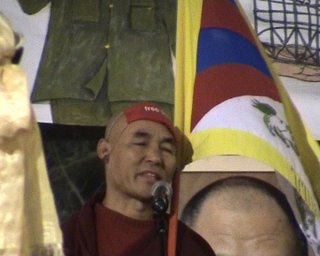 The curiosity drove me to attend the meeting called by Thubten Wangchen, who is a Buddhist monk, living in Barcelona, and representing his Holiness the Dalai Lama.
The curiosity drove me to attend the meeting called by Thubten Wangchen, who is a Buddhist monk, living in Barcelona, and representing his Holiness the Dalai Lama.My interest was based on my aim to meet personally a man who says that Tibetan people consider weapons not as the best way to reach the freedom for Tibet, in spite that his country was invaded by Chinese in 1959.
For the present there are about 6 million original Tibetan inhabitants in this country, and 7, 5 million of Chinese people who live in Tibet, what consider really a part of China.
A comment included in a interview to Wangchen called my attention. He said that never the Buddhist religion justified a holy war like Muslims, Sijhs or even Christians in the past.
The question is ¿what will happen with Tibet? I’m afraid that in the future the culture, the political orientation and the identity signs of Tibetan people, in general, will be water downed inside the Chinese environment. In fact, the Chinese authorities are making efforts to build god communications with Tibet, railway, roads, oriented to facilitate the immigration of Chinese people to this country.
Some difficulties of Mr. Wangchen speaking Spanish, minimized the message, but what I understood was that finally they are not asking for a really freedom, but for a determined kind of autonomy inside China.
I think that it has a lot to do with the pragmatic behaviour of Orientals and especially of the Buddhist. ¿Is it possible to oppose against the human tide that threat Tibet? ¿Or perhaps the best could be to reach enough power to protect the Tibetan interest, not only cultural or identity signs, but possibilities to improve the quality of life for them?
However I want to underline that my impressions are based only in the few knowledge I have about them, even that every day I become more and more interested on their philosophy.
On the other hand, I don’t know if this feeling is the same for all Tibetan People. Maybe there are some of them disposed to fight.
The weather in Barcelona, and of course in the San Jaume’s Square, was windy and uncomfortable. Despite of this, a window in the town hall was opened and the light shined inside the room. Maybe the Barcelona’s Mayor was listening to Mr. Wangchen’s speech, trying to find parallelisms between the request of autonomy for Tibet and the process of the “Estatut” for Catalonia.
After the meeting end, we walked across Ferran Street, towards Las Ramblas, and decided to eat something in a new Oyster Taverna. I thought in the new book by Arturo Perez-Reverte, “The painter of battles” and some words that he pronounced in the presentation of his book:
“¿What do you think about de pacifism?”.
“I don’t like the war, but there are inevitable wars. In the war you can’t put the other cheek. The tanks cannot be stopped with flowers. The dialog between civilizations and the good manners doesn’t drive to somewhere. All of us have a gun against the head; we can choose between remaining stopped or run fifteen meters. Fifteen meters that means a full life of love, freedom, dignity and culture”
At the time I was preparing an oyster to eat I thought in what is the best way: the pacific one, but trying to reach more power to control or the fight. I gave a sight around the Taverna. The seats were not very comfortable and I prefer the Cambado’s oysters, but the rest of food and the wine were not bad at all.
And then I saw him again. That time I felt that there were too many coincidences: the airport, last Thursday and yesterday. He was seated alone five or six meters away from our table, at my left, clearly looking to me, with very shining eyes, as he was little drunk.
His clothes were the same than the last time I saw him. The only difference was that he didn’t wear the New York’s cap. The waitress passed in front off me, and in the next second he was not there anymore.
This situation began to bother me a little.
